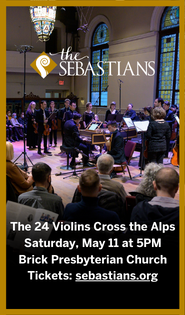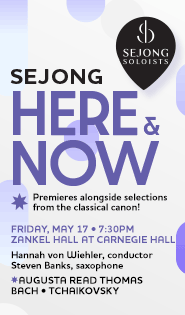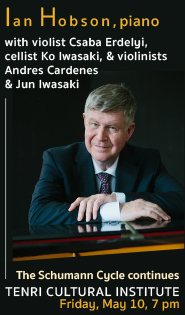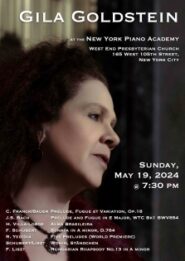Expressionist vocal works intensely rendered by Hong, Talea Ensemble
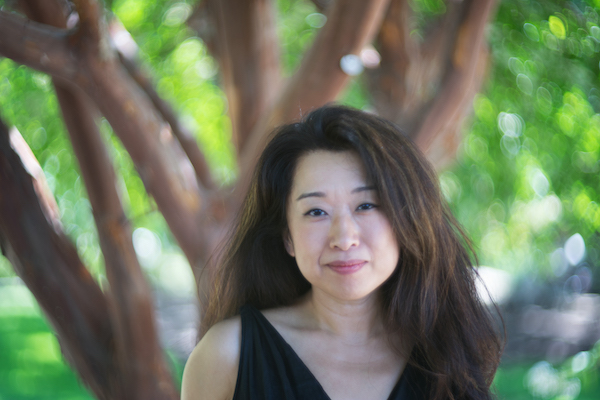
As composer Michael Hersch mentioned to the audience in between performances of two of his recent works Sunday evening, his music “isn’t done in the U.S. much anymore.” It’s an odd status for an accomplished and productive American composer, and it says something about how styles go in and out of fashion with administrators and audiences.
Hersch has a definite style, one that 100 years was at the forefront: expressionism. There has been enough of a revival of romanticism since the late 20th century to count it as a predominant style, since the academies moved on from the ideology of serialism. But expressionism has remained a niche—a personal choice for a handful of composers, like Hersch and Georg Friedrich Haas whose music was also heard Sunday. As played by the Talea Ensemble, conducted by Jim Baker at St. Paul & St. Andrew United Methodist Church, the challenges of expressionism have their limitations and rewards.
Along with Hersch, at the center of the concert was the excellent soprano Ah Young Hong. Each piece was a vocal work, with Hersch’s anonymous beneath the lemon trees and one step to the next, worlds ending (in its American debut) coming before intermission, followed by Haas’ … wie stille brannte das Licht.
Talea was equally fine. They were clearly well prepared and despite the drastic differences in instrumentation for each piece—only the final one used the full chamber orchestra—their playing was alert, responsive, and superbly balanced. One was particularly struck by moments in Hersch’s pieces where instruments overlapped pitch with Hong’s voice; these were technically excellent and had the uncanny sensation of creating a third, never-before-heard timbre.
Hong is the leading vocal interpreter of Hersch’s music, having recorded several of his pieces and premiered his monodrama On The Threshold of Winter. Her voice has an inherent beauty and shine, the timbre full and light, and her intonation was unerring, a superb vehicle for music that collapses any possibility of objectivity for a intense and raw depiction of internal moments.
The first work came from the pandemic experience of 2020, and on paper one would expect expressionism to be the ideal means for such music. But, at least as of yet, there have been no satisfying works about the pandemic in the aftermath of its depths (though there were some excellent ones that came out of the necessity of remote music making), and Hersch’s anonymous didn’t buck that trend.
Composers like Hersch appear to misstep when they go to poetry first instead of the music. For the eight short sections of the work, Hersch set fragments from five contemporary poets and one from Thucydides, each heavily symbolic of internal psychological agonies. The texts were so specific that they could not have universal meaning, and Hersch’s music seemed trapped within its own internal wrangling. It felt inarticulate, with the outline of meaning and direction but not the kind of details that give it form and the sense that it has a clear expressive purpose within.
Hong was impressive in her technique and energy, but the instrumental parts never seemed to engage with her voice, mostly settling for effect and even seeming somewhat ambivalent. There were microtonal moments that hinted at specific possibilities, but these disappeared almost immediately with no development, one couldn’t tell if there were intentional or the byproduct of too little editing.
One step, from 2022, was the kind of music one has come to expect from Hersch. Written for Hong, as was the opener, this used poetry from Jan Zwicky. Having one central voice and theme—a sense of controlled despair—seemed to bring concentration to the music. Here, voice and instruments worked together in the epitome of expressionism, less a lecture like the first work and more an unveiled internal dialogue between moods and mental states. Though there was more music, this all felt pared down and with a directed force. Hong’s singing also gained from greater support from the music; she seemed freed and graceful, even in sudden wide interval leaps up and down.
While the first work was observed, this had an emotional impact. Hersch can push his work to extremities, but has the skill to keep it all apprehensible. In contrast Haas, who can often seem like a wild man, sounded relatively conventional, though that’s no criticism of either the quality of his piece of the performance.
His text came from German symbolist poets like Georg Trakl and Theodor Storm, sung in German. This was the most dramatic and narrative work of the night, beginning with a tremendous crash then settling into flowing, near placid sections before rising into more turmoil, then repeating this cycle.
Though the text had to do with psychologically intimate relationships, the flow of the music felt like the evolution of the universe, with Hong’s voice a brilliant star shining through. Glimmers of sunlight from the winds mirrored this in the overall maelstrom of sound.
This was complex and involving, with an almost cheeky glance back at Alban Berg and the turmoil and suspense from his operas, as well as an almost vivacious depiction of pessimist philosophy. Hong was the key human element, compelling the listener to follow her line through this dense music. It was an exhilarating performance.
